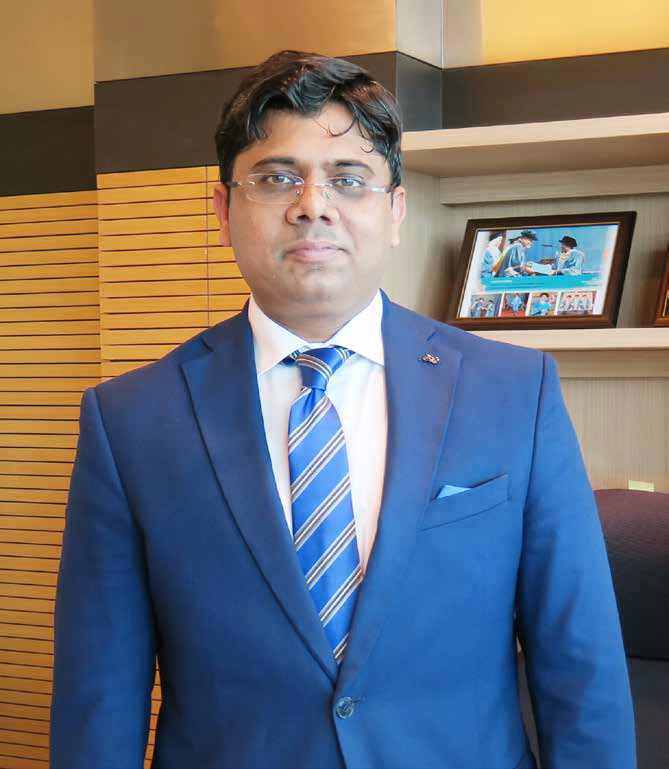–DR JAMSHAID ANWAR CHATTHA–
FORMER ASSISTANT SECRETARY-GENERAL TECHNICAL AND RESEARCH, IFSB
You have a wide range of experience in Islamic financial regulation and supervision, having worked extensively on regulatory policy and supervisory capacity development over the last decade. What are your views on the major regulatory impediments to the development of Islamic banking and finance?
The growth and popularity of modern Islamic finance throughout the past decade is evident in many jurisdictions. We can now see a lot of measurable progress of Islamic finance in various jurisdictions. With the exception of Iran and Sudan (which have fully Sharī’a-compliant banking systems), all Islamic finance industries are operating under the dual banking systems, where conventional financial institutions operate in parallel to Islamic financial institutions (IFIs).
The degree of regulatory developments varies from one jurisdiction to another. Some countries have well-developed public and market infrastructure supporting Islamic finance, while others are developing at a slower pace, gradually proportionate to the market share of Islamic banking in the country. From my experience, there are four key elements which have an impact on the regulatory framework for Islamic finance. They are:
- An enabling legal framework has a direct impact on the business of the financial institutions including the IFIs. A fair and transparent legal framework, (including proper enforcement), brings legal certainty and predictability of outcomes. A sound legal framework includes the appropriate legal infrastructure – with appropriate financial laws that accommodate the specificities of IFIs and markets. For example, having the appropriate contract laws, insolvency laws, trust laws, laws governing collateral, etc., will affect the types of products and services IFIs can offer within the jurisdiction. Tax neutrality provisions are also part of this framework as they are imperative to ensure that Islamic financial instruments and structures are not subject to higher tax liabilities relative to their conventional counterparts.
- A strong prudential and regulatory framework is an important component in the development of Islamic finance to support sustainable growth and foster financial stability. This includes providing a robust supervisory and regulatory framework, in line with the recommendations of both the BCBS and the IFSB – covering the core elements inter alia, investment account holders, risk management policies, corporate governance, transparency and Shari’a governance, stress testing, and capital adequacy – to ensure a level playing field to market participants.
“A FAIR AND TRANSPARENT LEGAL FRAMEWORK, (INCLUDING PROPER ENFORCEMENT), BRINGS LEGAL CERTAINTY AND PREDICTABILITY OF OUTCOMES.”
- Active financial market infrastructure is also key. Lack of active primary and secondary markets for Shari’a-compliant instruments (i.e. sukūk issuance), trading and settlement, limited Islamic inter-bank market and inefficient financial infrastructure including liquidity infrastructure to support the Islamic finance remain serious concerns for IFIs. In terms of liquidity infrastructure, IFIs require Shari’a-compliant liquidity markets and financial safety nets such as Sharī’a- compliant lender of the last resort (SLOLR) and Sharia-compliant deposit insurance scheme (SCDIS) from the central bank.
- Supervisory capacity is also a key element in the development of Islamic finance. Lack of qualified professionals with a depth and breadth of Islamic finance knowledge and experience is common in many countries in which Islamic finance operates. It is therefore imperative for academic and training institutions to work together with market participants and supervisors to develop and enhance the skills, expertise and capabilities needed to support the development of the industry. The range of expertise should include broad-based approach covering finance professionals and Sharī’a scholars.
Your career has included substantial time, as a Project Manager, and then again as Assistant Secretary-General (Technical), at the Kuala-Lumpur-based Islamic Financial Services Board (IFSB), the international standard-setting organisation for Islamic finance. What do you consider your best memories with regard to the technical work at the IFSB and its contribution to the development of global Islamic finance?
The IFSB has, for me personally, been a great place for acquiring a wealth of Islamic finance expertise by virtue of its broad interactions with the regulators and international institutions.
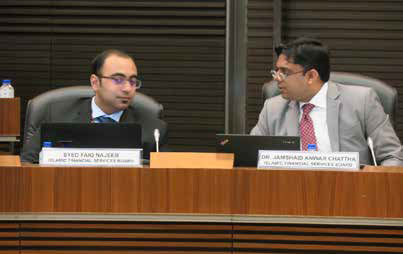
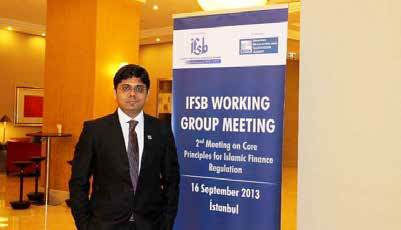
There are many memories on which I take pride in while serving the organisation. One such memory is related to the development of IFSB’s Core Principles for Islamic Finance Regulation (CPIFR) (Islamic Banking segment) or IFSB-17. I was also involved in developing the projects, among others, for the development of frameworks for the stress-testing of Islamic banks (IFSB-13), and financial safety nets including Shari’a- compliant lender-of-last-resort (SLOLR) (WP-1), and the Pillar II equivalent (IFSB-16: key elements of the supervisory review process) for supervisors regulating Islamic banks.
Let me share the story of the IFSB’s CPIFR – its importance in the development of global Islamic finance, and as a tool for supervisory authorities to carry out self-assessments on the progress of their regulatory frameworks in achieving greater consistency in the implementation of the IFSB Standards.
The CPIFR is a compendium of the IFSB Standards including IFSB-1 (Risk Management), IFSB-3 (Corporate Governance), IFSB-10 (Shari‘a Governance), IFSB-12 (Liquidity), IFSB-13 (Stress Testing), IFSB-15 (Revised Capital Adequacy), GN-6 (LCR and NSFR), and IFSB-16 (Pillar II). Each CPIFR is supported by a set of assessment criteria, which is further divided into essential and additional criteria. Compliance with the CPIFR will demonstrate an increased implementation of the IFSB Standards.
I was the Project Manager (back in 2012) for the development of the CPIFR project, coordinating a working group comprising of 23 regulators (central banks), the IMF, the World Bank, the Basel Committee, the IsDB, as well as the ADB. I remember that within the working group was a strong determination and commitment to developing high-quality CPIFR, which could become best practices for the purposes of undertaking financial sector assessments and preparing Reports on the Observance of Standards and Codes by the IMF. The CPIFR were approved for adoption (among member countries) by the IFSB Council in April 2015.
On May 24, 2018, after years of rigorous due process and high-level interactions by the IFSB, the IMF’s Executive Board endorsed the use of the IFSB’s CPIFR and the associated assessment methodology for its Financial Sector Assessment
Program (FSAP). This was a game-changer for the Islamic finance industry. Another milestone came two years later, in January 2020, when the IFSB announced that its CPIFR will also be included in the Financial Stability Board’s (FSB) Compendium of Standards.
These two major developments at the international level reflect the importance of the CPIFR and consolidates the international recognition of Islamic finance’s robust regulatory eco-system.
The IMF’s endorsement of the CPIFR is not just a momentous landmark for the Islamic finance industry as a whole; on the national scale, the CPIFR will help supervisors in achieving greater consistency in supervisory surveillance and oversight, and lays down an integrated prudential framework which complements the international architecture for financial stability.
Currently there are 15 jurisdictions where Islamic banking accounts for more than 15% of the market share. These “systemically-important” jurisdictions are the primary beneficiaries of the IMF’s implementation of the CPIFR, and would subsequently serve as benchmarks for other jurisdictions where Islamic finance is yet to gain a market share of above 15%.
Finally, let me add that as a result of compliance with CPIFR, we should see an increased convergence of supervisory practices for Islamic finance across jurisdictions.
Critics argue that the work of the IFSB is predominantly a ‘copy and paste’ of the regulatory framework of its counterparts such as the Basel Committee on Banking Supervision. Having been directly involved in some of the IFSB’s pioneering work, how do you feel about this? Is this criticism valid?
Actually, this issue has been misunderstood by the critics. The ‘copy and paste’ phenomenon has been under scrutiny for a while. We, at the IFSB Secretariat, always had this discussion. There are two views among the supervisors – those who prefer to have all the guidance in one document so that they could apply such regulation to Islamic banks, and those who wanted to have separate guidance focusing only on Islamic finance specificities.
However, beyond that, there are two things that we need to understand in the context of this criticism.
First, the IFSB has a broader mandate to promote and enhance the soundness and stability of the Islamic financial services industry by issuing global prudential standards and guiding principles for the industry, broadly defined to include Islamic banking, Islamic capital markets and Islamic insurance (takāful). In this context, the work of the IFSB complements its conventional counterparts – the Basel Committee on Banking Supervision (BCBS), International Organisation of Securities Commissions (IOSCO) and the International Association of Insurance Supervisors (IAIS).
“THE IFSB HAS A BROADER MANDATE TO PROMOTE AND ENHANCE THE SOUNDNESS AND STABILITY OF THE ISLAMIC FINANCIAL SERVICES INDUSTRY BY ISSUING GLOBAL PRUDENTIAL STANDARDS AND GUIDING PRINCIPLES FOR THE INDUSTRY.”
Second, Article 4 of the IFSB Articles of Agreement (AOA) states that the IFSB has a mandate to promote the development of a prudent and transparent Islamic financial services industry through introducing new, or adapting existing, international standards consistent with Shariʻa principles, and to recommend these for adoption.
In the process of executing Article 4 of the AOA, we need to understand the approach of not needing to rewrite nor ‘reinvent’ the wheel; rather the approach taken was to adapt the existing guidance which are common (and thus applicable) to both conventional and Islamic financial institutions, and add an additional layer to reflect the context and specifics of Islamic finance. The IFSB has a Shari’a Committee which reviews and advises the potential Shari’a issues in the adaptation of any conventional guidance for Islamic finance. However, key issue has been with the degree of value addition for supervisors and promptness by the IFSB to the industry.
However, taking the criticism positively, in 2019, the IFSB has responded by making relevant amendments in the IFSB Guidelines and Procedures for the Preparation of Standards. Among others, the revised Guidelines introduced changes in the due process of developing new standards to take into account either “comprehensive” or “supplementary” approach.
The comprehensive approach would involve the IFSB providing a complete regulatory and supervisory guidance for Islamic finance (which could include adoption of certain principles directly from conventional standards as they do not require any changes). These principles will be retained as unamended by the IFSB, as they are equally applicable to both Islamic and conventional finance, and do not raise any Shari’a concerns.
The supplementary approach would involve the IFSB only providing specific regulatory and supervisory guidance in area which either require modification of conventional standards to meet the specificities of Islamic finance, or additional aspects within Islamic finance which not covered by conventional standards. In this approach, the principles from conventional standards which are equally applicable to both Islamic and conventional finance will not be included in the IFSB standard, and supervisors would be asked to refer to the conventional standards for details in managing them. The IFSB will provide the mapping of such guidance.
The adoption of these two approaches is also to address the speed to which the IFSB is able to respond to changes in the global financial industry. In both these contexts, we should start seeing the results in the near future, and I am hopeful that this may change any negative perceptions about the IFSB and the important work it is doing.
You have worked with international organisations in developing Islamic finance regulatory frameworks. What is the nature of your involvement with the IMF? Why are the multilateral institutions like the IMF and the World Bank interested in promoting Islamic banking and finance?
One of the reasons for the international recognition of Islamic finance is because international organisations such as the IMF and the World Bank, and international standard-setting organisations for conventional financial systems such as BCBS, IOSCO, and IAIS have been closely working with the IFSB.
In particular, the IMF’s engagement with Islamic finance is longstanding. For the past 20 years, the IMF has been cooperating fastidiously with many regulatory and supervisory authorities overseeing Islamic finance and providing technical advice as needed, and with other international organisations (e.g. World Bank, the Arab Monetary Fund, and the IsDB) as well as standard-setters on Islamic banking issues (e.g. IFSB and AAOIFI). It is important to recall that the IMF played a crucial and catalytic role in establishing the IFSB – coordinating and hosting many consultative meetings among stakeholders, which culminated in the establishment of the IFSB in November 2002. The IMF has, since 2003, been an Associate Member of the IFSB.
My engagement with the IMF started from the IFSB as short- term expert (STX) for my first IMF technical assistance (TA) mission (in 2008) on Islamic finance regulatory framework for the Kyrgyz Republic. This was followed by participation in a few IMF missions while I was with the Central Bank of Kuwait. Since September 2019, I have been working with the IMF as an STX (Islamic banking supervision advisor) for various central banks for Islamic finance regulatory framework.
“IT IS IMPORTANT TO RECALL THAT THE IMF PLAYED A CRUCIAL AND CATALYTIC ROLE IN ESTABLISHING THE IFSB – COORDINATING AND HOSTING MANY CONSULTATIVE MEETINGS AMONG STAKEHOLDERS.”
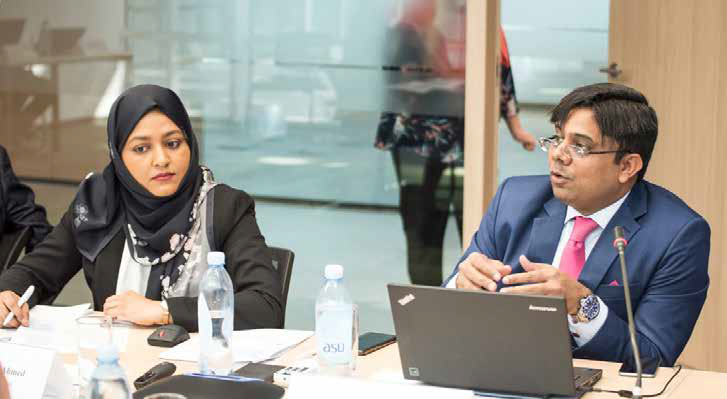
Working with the IMF is a great experience in developing supervisory capacity on Islamic finance. In particular, my role involves drafting policy advice, developing specific regulatory framework, amending exiting and developing new regulatory templates for supervisory reporting, and conducting training on supervisory capacity for Islamic finance professionals.
To date, as an Islamic banking supervision advisor to the IMF, I have provided policy advice to various central banks through 13 IMF TA missions – for Djibouti, Iraq, Libya, Kuwait, Kyrgyz Republic, Nigeria and Yemen, as well as one TA mission with the World Bank for Saudi Arabia.
Let us ask you a hypothetical question. Say you are in the position to influence the direction of Islamic banking in a country with significant Islamic finance market share. What would be your considerations to develop a policy framework to replace conventional banking with Islamic banking?
Currently, there is no such precedent available where a conventional banking system by any regulator has been completely revamped and replaced with Islamic banking. However, at political leadership level, there is the case of Libya which has enacted a new banking law in which the banking system is in transition from a conventional to a full-fledged Islamic banking system. This will make it the third country, after Sudan and Iran, where there will be 100% Islamic banking. All other jurisdictions where Islamic finance operates continue to have dual-banking system.
As far as I know, no authority to date has announced, or will publicly announce, its intent to convert the conventional banking with full-fledged Islamic banking.
In my opinion, the considerations to develop a policy framework to replace conventional banking with Islamic banking in any jurisdiction should be market-driven rather than politically-driven. If there is adequate rising demand among the customers for Islamic banking products, then it should be considered by the relevant authorities in their policy framework as a road map for forward guidance on the Islamic finance industry.
The key considerations in the policy should include ensuring the enabling environment for Islamic banking operations together with addressing key preconditions for an effective Islamic banking supervision, and the necessary public and market infrastructure – including financial safety nets and insolvencies regime. This is a point which is elaborated in the next question.
You have worked in various countries, as well as interacted with, and travelled to a great number of countries in relation to your work for Islamic financial regulation and supervisory capacity development. What are the key elements and priorities, within a regulatory framework that gives an indication on the seriousness of the country/ regulator in implementing Islamic finance?
It is crucial to acknowledge that Islamic banking has distinct operations with differing risk profiles and balance sheet structures compared to conventional banking. Therefore, the approach to regulating and supervising Islamic banking should be reflected in parallel with the nature of risks to which Islamic banks are exposed, which would consequently require additional or different regulatory and supervisory practices.
We need to assess the seriousness objectively. There are at least two fundamental conditions to being a good Islamic finance jurisdiction: (a) robust and deep financial infrastructure; and (b) financial sector catering to Islamic finance specificities. The former emphasises on the need to have a proper framework in place in the jurisdiction. The latter requires making suitable adjustments to the existing infrastructure components to cater the peculiar features of the Islamic finance.
In my experience of conducting 100+ technical workshops on Islamic finance for supervisors, (for the IFSB, IMF, World Bank, IsDB, Toronto Centre, AMF, Cambridge IFA), in Middle East, South Asia, Central Asia, Africa and Europe, the jurisdictions which have developed a medium-term action plan for an Islamic banking regulatory framework and have addressed the following seven components are the ones which are very serious in supervising Islamic finance:
- Have a formal unit/division, with a clear mandate and adequate internal capacity and skill sets, within a central bank or supervisory authority to oversee Islamic finance operations. In this formal structure, the unit is well-integrated with other organs such as policy affairs, supervision and surveillance, financial stability, and consumer protection to achieve long-term sustainability of Islamic finance growth, stability and resilience;
- Have addressed key pre-conditions (e.g. financial safety nets such as SLOLR and SCDIS, insolvency regime, and financial infrastructure including Islamic inter-bank market) reflecting the local financial and institutional environment complexities;
- Adopted comprehensive and well-defined accounting principles and rules that are internationally accepted, including implementing International Financial Reporting Standards such as that of the AAOIFI for Islamic banks;
- Strengthened the supervisory approach and techniques for Islamic banks including On-site and Off-site manuals, and enhancing the periodic supervisory reporting;
- Developed and issued key prudential regulations (core minimum) and norms for Islamic banks in line with the Basel and IFSB standards;
- Have in place secure, efficient and well-regulated payment and clearing systems (e.g. real-time gross payment and settlement system and market information systems such as clearing house, and trade repository) for the settlement of financial transactions including those of Islamic banks; and
- Developed Shari’a-compliant high-quality liquid assets (sukūk) for financial sector liquidity management purposes and have active primary and secondary markets for sukūk issuance, trading and settlement.
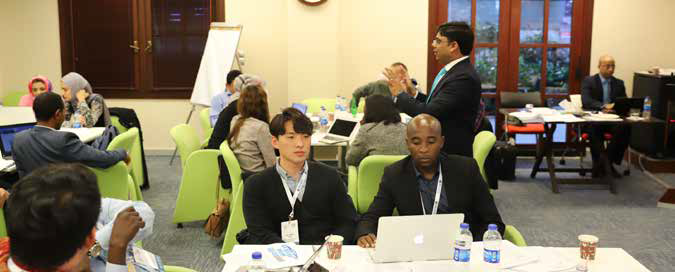
“THERE IS A STRONG NEED TO HAVE LEADERSHIP THAT NOT ONLY DELIVERS THE MANDATED KEY PERFORMANCE INDICATORS BUT ALSO DEVELOPS MORE LEADERS AND SPENDS ON HUMAN CAPITAL IN ORDER TO REMAIN RELEVANT AND SUSTAINABLE.”
Let us take a step back. There are those in the industry that are not entirely satisfied with the work of the Islamic finance infrastructure institutions – the likes of the IFSB, AAOIFI, IIFM and CIBAFI. What is your take on these views, and do you feel these bodies can be more effective?
Actually, in our daily life, very few like constructive criticism. I tend to believe, some criticism from the industry has been unwarranted. On the other hand, some criticism is fair. Criticism such as the performance and pro-activeness of Islamic finance infrastructure institutions in adding value on a consistent basis to their stakeholders, have to be taken constructively and investigated accordingly.
Let us not forget that even the BCBS has been criticised, despite it being very proactive in responding to the needs of the banking industry. This tells us that challenges and criticisms have to be faced by all industries, and Islamic finance infrastructure institutions are not spared. Each journey has it bumps.
There are needs and expectations from the industry stakeholders that all these institutions should respond to in a timely manner. Take a case of issues related to the (still ongoing) COVID-19 pandemic – BCBS issued its guidance to stakeholders within a month (in March 2020), and has subsequently issued a lot of guidance notes. Similarly, the IASB/IFRS issued guidance to the industry promptly to take into account accounting issues due to moratoria. On the other hand, AAOIFI issued clarity on COVID-19 in May and June 2020, and the IFSB is yet to issue any guidance to its stakeholders. This highlights the issue of promptness to address issues in a timely manner. This is where I see much of the criticism is valid.
Each of the Islamic finance infrastructure institutions has its own resource envelope, as well as constraints and challenges in which it operates. Hence, the desire to bring the organisation ‘up to speed’ – to increase effectiveness and efficiency, for example – needs to thoroughly examine every element of these institutions and their capacity. Let me shed light on few issues which may be worth looking at.
First, we need to ensure consistency of the governance structure among the three standard-setting institutions (IFSB, AAOIFI and IIFM). Each of these institutions has its own mandates and governance structure. At this time, only the IFSB operates in a relatively more robust governance structure. The consistency of governance structure will increase the principle of accountability and performance.
Second, the quality of the first and second-tier leadership to steer Islamic finance. This has been a great challenge for these institutions. There is a strong need to have leadership that not only delivers the mandated key performance indicators but also develops more leaders and spends on human capital in order to remain relevant and sustainable.
Third, higher expectations versus limited resources. There are serious issues with the resources that these Islamic finance infrastructure institutions, limiting their capacity to deliver timely and proactively. For instance, the work of the IFSB complements that of the BCBS, IOSCO and the IAIS. This suggests that the IFSB is doing the work of three major standard-setting bodies with the same resources and effort of its counterparts. This is not the case.
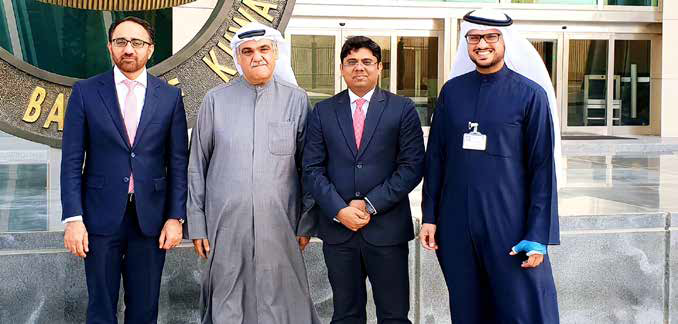
In terms offorward guidance, I believe, there are still areas which require full attention by these Islamic finance infrastructure institutions. For instance, there is need to develop policy and regulation for Islamic social finance instruments and its integration with mainstream Islamic finance, as well as a focus on regulation for Islamic microfinance institutions.
I believe that these four institutions should actively be within each other’s core membership circle, and at the very least, have reciprocal arrangements to reduce/streamline the redundancy and duplication of efforts.
You have worked with a number of leading personalities in the world of Islamic banking and finance. Who amongst them has influenced your own thoughts and work the most?
It is indeed a blessing to have a good boss who can inspire you, and who believes in you.
There are few leading personalities who I have been lucky enough to work with and learn from, in the Islamic finance world. It is not possible to mention all here, but these thoughtful leaders include H.E. Dr. Mohammad Y. Al-Hashel, Governor of the Central Bank of Kuwait, the inaugural Secretary-General of the IFSB, Prof. Datuk Dr. Rifaat Ahmed Abdel Karim, IFSB Consultant, Professor Simon Archer, and Mr. Abdullah Haron, then IFSB’s Assistant Secretary-General and my immediate supervisor.
Each one of them has helped me in different ways, with mutual respect, to shape my thoughts and grip on Islamic finance.
Let me share with you – Professor Rifaat provided me and the IFSB team sound technical mentoring on Islamic finance. But above and beyond that, he showed a great amount of kind-heartedness and fatherly touch in terms of intellectual growth and leadership. I can honestly say that I would not be where I am today, or where I inspire to be, had he not believed in me by providing me the opportunity to serve the Islamic finance industry 13 years ago.
While working with H.E. Dr. Al-Hashel, I learned clarity of thought on Islamic finance implementation, leadership skills, and technical understanding of the broader Islamic finance issues. It was always challenging for us to meet His Excellency’s expectations due to his high standards. He was always appreciative of good work, and this is where I learned a rigourous due process of solving problems and issues pertaining to Islamic finance.
Working with Abdullah Haron was great experience. As a supervisor, he gave us space, allowed us to make mistakes, and take lessons from those mistakes. He did not cherish the team failures. This is a legacy that I still carry in my career.
Prof. Archer, who I still enjoy working with, albeit remotely, on the other hand has profound technical knowledge and has immensely contributed to Islamic finance and the development of the Islamic finance regulatory framework. A man who I have learnt much from, a true teacher and mentor.
Central banks around the world are facing extraordinary times as a result of the COVID-19 pandemic. In your view, what could be the response of the Islamic banking and finance industry, and what advice you would offer with regard to the potential implications of COVID-19, to supervisors regulating Islamic banks?
No doubt, supervisors are facing extraordinary times with the COVID-19 pandemic, and the start of a ‘new normal’, which may last for some time. This pandemic has brought with it numerous supervisory implications which require measures that are both pragmatic and extraordinary. In such testing times, it is expected that supervisory policy choices, for the containment of the crisis, will involve certain degrees of trade-offs. However, supervisors should ensure they act with agility and resilience, as ensuing financial stability is a marathon task.
The speed, magnitude and dramatic economic effects of COVID-19 – engulfing not one country or region, but the whole world – are seemingly greater than those from the 2008 Global Financial Crisis (GFC). We should recall that Islamic finance was protected from the first wave of the GFC; nevertheless, when the liquidity conditions, together with credit availability were tightened globally, certain Islamic financial institutions were exposed to the spillover effects, which in turn led to problems of viability and, in extreme cases, insolvency of certain institutions. This COVID-19 pandemic on the other hand brings immediate (but certainly proportionate) implications for all types of banking systems.
In the context of the pandemic, I have penned two comprehensive articles – one for ISFIRE (April 2020) and one for Toronto Centre (May 2020). The latter outlines seven implications and priorities for supervisors regulating Islamic banks, as:

- ensuring supervisory transparency, clarity in regulatory interventions, and a level-playing field for Islamic banks;
- navigating a tricky trade-off between regulatory capital requirements and economic growth;
- managing Islamic banks’ asset quality and the treatment of moratoria and non-performing financing;
- dealing with a liquidity crunch and providing Shari’a-compliant liquidity support and lender-of-last-resort facilities;
- providing supervisory support for issuing sovereign
sukūk for fiscal deficits;
- evaluating stress testing and credit quality; and
- reviewing financial safety nets and insolvency regimes for Islamic banks.
You have been a banking regulator, standard-setter, and a policy advisor – quite an achievement at such a young age. Which of these roles you have enjoyed the most, and what would be your advice and direction to young graduates, who wish to pursue a career in Islamic banking and finance?
I am humbled to have achieved these roles, and been given this exposure, at this age. Alhamdulillah.
What I can say is that from these experiences, with each role having its own uniqueness and a complementary perspectives, I have enjoyed both the learning and the contributing experiences offered by the respective organisations.
However, policy advice is something I have enjoyed the most. Let me explain.
I have learned in 14 years that policy formulation, policy implementation and policy advice, are three different things. When you develop a particular policy, you think about entire Islamic finance industry; when you are in position to implement such a policy, you have to take into account the local context and environment. On the other hand, when you provide advice on a specific policy (to a regulator), you are required to link it with other preconditions, which should be in place in order for such policy to be effective and successful.
My advice to young graduates would be, among others:
On campus, choose one field of Islamic finance – Islamic banking, takāful (Islamic Insurance), Islamic capital markets, Islamic microfinance, etc. The approach should be generic to vertical specialists on learning Islamic finance. Once you choose your field, learn not only a theoretical perspective about that field including theory and variations in practice, but adequate problem solving skills and knowledge of industry developments. Thus, your assignments, research, thesis, and market knowledge, shall focus on that particular field. As Islamic finance itself is expansive, this focused approach will help young graduates avoid being a “jack of all trades, but master of none”.
I hold on to a sharing by Sirajuddin Aziz, a prolific writer and CEO Group Financial Institutions at Habib Bank AG Zurich, who said that “having aspirations (or being ambitious) is not a negative thing. It actually makes us diligent”. This teaches a person to be confident and humble at the same time. Never indulge in self-deception that you are the best. Early in your career, monetary rewards should not entice you to jump ships, though, the proverb ‘a rolling stone gathers no moss’ has great validity.
Leave behind a good legacy, wherever you work. In my experience, it is impossible to succeed with in a negative or toxic environment. Never compromise on your professional integrity. Again Sirajuddin Aziz’s words resonate – “trouble and challenges bring experience and experience is the Mother of Wisdom.” As you grow, you learn how to deal with disappointments. Hard work, passion, and sincerity are a winning combination to possess, and “should be the predominant armour in our personality.”
Finally I would like the young generation to believe what Martin Luther King once said: “Our lives begin to end the day we become silent about things that matter”.
What can we expect from you in the coming years? Are there any interesting plans in the pipeline, or aspirations that you wish to share with our readers?
It is always good to have something beautiful in sight. Likewise, it is great to have quest for knowledge, and clarity of thought in Islamic finance issues. I have held a strong view that one does not need a formal position to contribute to the Islamic finance industry, (or to any industry or endeavour), as everyone is able to contribute in many ways and on different platforms.
I am in the Islamic finance field by choice for life. Over the last one and a half decade, I have only worked six months for a conventional bank. All my career and post-graduate education has been in the field of Islamic banking and finance. I believe, being a strong advocate of Islamic finance regulatory framework, I have a role to play in the development and promotion of robust Islamic financial ecosystem globally.
Having said that, in this fast-evolving environment, it is essential to polish talent, continue acquiring knowledge and developing new skills. I intend to, with God’s will, continue working with international organisations to develop Islamic finance regulatory frameworks for central banks, and contribute through writing on pertinent issues for supervisors regulating Islamic finance. I believe that writing based on passion and conviction gives a beautiful feeling of satisfaction. This I intend to consciously continue doing for as long as I am able to.
